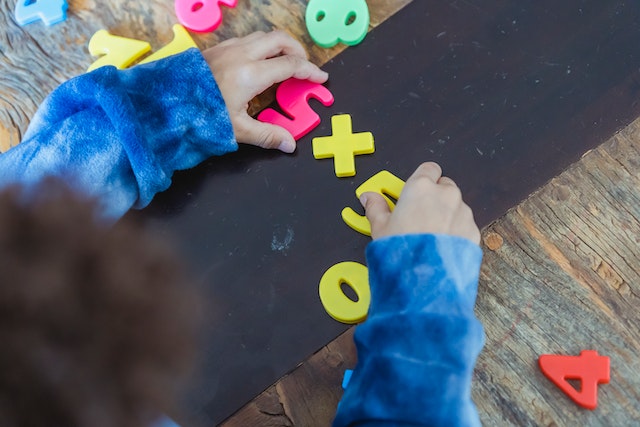Math can be a scary subject for adults, let alone young children. But introducing math to pre-K children doesn’t have to be intimidating. It can actually be fun!
Fun Ways to Introduce Math To Pre-K Children
Here are some simple ideas that you can use to help your child learn basic math concepts in a fun and engaging way.
Counting Games
One of the simplest ways to introduce math concepts is through counting games. Counting games can be a great way for kids to practice their counting skills while having fun. You can use everyday items such as toys or coins, or even make up your own counting games with your child’s favorite stuffed animal or toy.
Patterns & Sorting
Patterns are an important part of early math education, and they don’t have to be boring either! Patterns come in all shapes and sizes, from colors and textures to sizes and shapes. Involve your child in the pattern-making process by letting them pick the colors or objects they want to use and then helping them design their own patterns. Once they become familiar with patterns, you can introduce sorting games that involve organizing objects by color, size, shape, etc.
Pattern recognition will also help them understand more advanced mathematical concepts later on.
Number Recognition & Identification
Another basic math skill that pre-K children should learn is number recognition and identification. This can be done by playing simple matching games such as memory or by using flashcards that contain numbers and pictures of corresponding quantities (e.g., one apple). You can also make up your own activities like asking your child which number is missing from a sequence or what comes next in the sequence? This helps strengthen their understanding of numbers as well as their problem solving skills.
Math doesn’t have to be intimidating for pre-K children! With these fun activities, you can easily introduce basic math concepts in a way that engages your little one’s attention while still providing educational value. By introducing these concepts at an early age, you’ll set the foundation for future success in mathematics for years to come!

How to Introduce Math Concepts to Preschoolers
Math is an important subject for kids of all ages, but it can be especially daunting for parents of preschoolers who are just beginning to learn the basics. Fortunately, introducing math concepts to young children doesn’t have to be overwhelming! There are lots of fun and creative ways to get your child interested in math without feeling overwhelmed by numbers. Let’s take a look at some tips for introducing math concepts to preschoolers.
Make It Fun!
The best way to make sure your child is engaged with their math lessons is to make learning enjoyable. Instead of stressing out over drills and memorization, try playing games instead! You could try counting objects together, or matching shapes and colors. These activities help your child practice basic addition and subtraction skills, as well as visual-spatial reasoning. Additionally, you can use everyday tasks like grocery shopping or sorting laundry as opportunities for learning new skills. For example, when you’re grocery shopping, you can talk about how many items you need or how much they cost. These real-world scenarios provide a natural context in which your child can start understanding numbers.
Introduce Numbers Through Storytelling
Storytelling is another great way to introduce math concepts in a more relaxed setting. You can tell stories about animals that count or use various number words throughout the story (e.g., “once upon a time there were four little bunnies…”). This helps your child develop familiarity with numbers while also keeping them engaged with the narrative. You could also read books about counting together and then ask questions about what happened in the book afterward – this helps reinforce the concepts learned through storytelling while also allowing them to practice their verbal communication skills at the same time!
Practice With Everyday Objects
Using everyday objects can be another effective way of teaching numbers and other basic math concepts without making it feel like a lesson – think things like measuring spoons when baking cookies or blocks when building towers together. Having tangible objects around them will help give your child an understanding of what each number looks like in physical form, which is important for developing an overall grasp on mathematics. Additionally, seeing physical examples helps make abstract concepts easier for young children to understand by providing concrete examples they can interact with directly!
Introducing math concepts doesn’t have to be stressful for either parent or child – it just takes some creativity and patience! By breaking down complex topics into smaller pieces and using everyday objects that are already familiar to your child, you can make learning fun while still helping them master essential math skills that will benefit them later on in life! With these tips in mind, you’ll have no problem getting your preschooler interested in mathematics from an early age!
